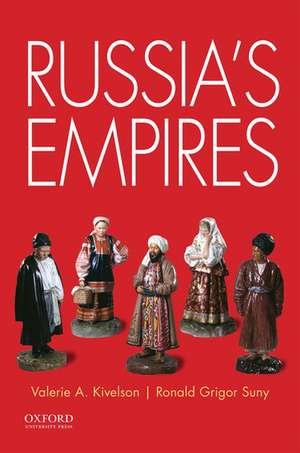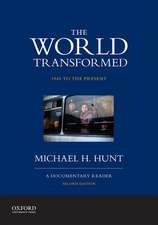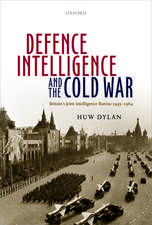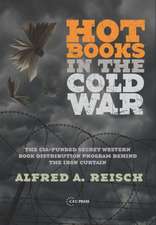Russia's Empires
Autor Valerie A. Kivelson, Ronald Sunyen Limba Engleză Paperback – 5 ian 2017
Preț: 328.11 lei
Preț vechi: 352.94 lei
-7% Nou
Puncte Express: 492
Preț estimativ în valută:
62.80€ • 68.24$ • 52.79£
62.80€ • 68.24$ • 52.79£
Carte tipărită la comandă
Livrare economică 09-15 aprilie
Preluare comenzi: 021 569.72.76
Specificații
ISBN-13: 9780199924394
ISBN-10: 0199924392
Pagini: 448
Dimensiuni: 155 x 229 x 31 mm
Greutate: 0.82 kg
Editura: Oxford University Press
Colecția OUP USA
Locul publicării:New York, United States
ISBN-10: 0199924392
Pagini: 448
Dimensiuni: 155 x 229 x 31 mm
Greutate: 0.82 kg
Editura: Oxford University Press
Colecția OUP USA
Locul publicării:New York, United States
Recenzii
In this remarkable work, two of the leading historians of the "imperial turn" have drawn on the past quarter-century of historical work and produced the most readable and insightful single volume of Russian history to date. Valerie Kivelson and Ronald Suny reveal how Russia's empires functioned as polities by employing not just coercive power but discursive power. In doing so, they illuminate how Russia also became an "imperial nation," one where national and imperial policies developed simultaneously yet frequently produced tensions. Russia's Empires is historical synthesis at its finest." - Stephen Norris, Miami University
Russia's Empires provides an elegant, stimulating and comprehensive account of Russian history, placing the management of imperial diversity at the heart of the narrative. It is both readable and rigorous, and should help to introduce a new generation of students to the many fascinations of Russia's imperial past and present." - Alexander Stephen Morrison, Nazarbayev University
Original, engaging, authoritative, and beautifully illustrated - no other short survey engages Russia's remarkable history of diversity as fully and effectively as Russia's Empires. This should become the field's go-to text for college courses. An impressive achievement." - Willard Sunderland, University of Cincinnati
Russia's Empires provides an elegant, stimulating and comprehensive account of Russian history, placing the management of imperial diversity at the heart of the narrative. It is both readable and rigorous, and should help to introduce a new generation of students to the many fascinations of Russia's imperial past and present." - Alexander Stephen Morrison, Nazarbayev University
Original, engaging, authoritative, and beautifully illustrated - no other short survey engages Russia's remarkable history of diversity as fully and effectively as Russia's Empires. This should become the field's go-to text for college courses. An impressive achievement." - Willard Sunderland, University of Cincinnati
Notă biografică
Valerie Kivelson is Valerie Kivelson (PhD Stanford University) teaches at the University of Michigan, where she is Thomas N. Tentler Collegiate Professor and Arthur F. Thurnau Professor of History. Her publications include Desperate Magic: The Moral Economy of Witchcraft in Seventeenth-Century Russia (2013); and Cartographies of Tsardom: The Land and Its Meanings in Seventeenth-Century Russia (2006). She is the editor of Witchcraft Casebook: Magic in Russia, Poland, and Ukraine, 15th-21st Centuries [Russian History/Histoire russe vol. 40, nos. 3-4 (2013)], and co-editor, with Joan Neuberger, of Picturing Russia: Explorations in Visual Culture (2008).Ron Suny is the William H. Sewell Jr. Distinguished University Professor of History at the University of Michigan, Emeritus Professor of Political Science and History at the University of Chicago, and Senior Researcher at the Higher School of Economics in St. Petersburg, Russia. The author and editor of eighteen books, Suny pioneered the field of Soviet nationality studies, introducing the constructivist approach to the making of nations into Russian and Soviet studies. He wrote extensively on the South Caucasus (Armenia, Azerbaijan, and Georgia), the Russian Revolution, nationalism and empire. Among his principal works are: The Baku Commune, 1917-1918: Class and Nationality in the Russian Revolution; The Making of the Georgian Nation; Looking Toward Ararat: Armenia in Modern History; The Revenge of the Past: Nationalism, Revolution, and the Collapse of the Soviet Union; and The Soviet Experiment: Russia, the USSR, and the Successor States (New York: Oxford University Press, 1998; 2011).











